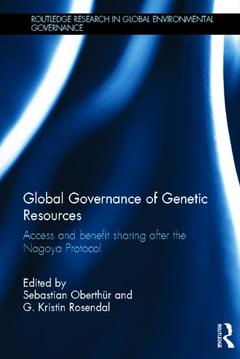Global Governance of Genetic Resources Access and Benefit Sharing after the Nagoya Protocol Routledge Research in Global Environmental Governance Series
Coordonnateurs : Oberthür Sebastian, Rosendal G.

This book analyses the status and prospects of the global governance of Access Benefit Sharing (ABS) in the aftermath of 2010?s Nagoya Protocol to the Convention on Biological Diversity (CBD). The CBD?s initial 1992 framework of global ABS governance established the objective of sharing the benefits arising from the use of genetic resources fairly between countries and communities. Since then, ABS has been a contested issue in international politics ? not least due to the failure of effective implementation of the original CBD framework. The Nagoya Protocol therefore aims to improve and enhance this framework. Compared to the slow rate of progress on climate change, it has been considered a major achievement of global environmental governance, but it has also been coined a ?masterpiece of ambiguity?. This book analyses the role of a variety of actors in the emergence of the Nagoya Protocol and provides an up-to-date assessment of the core features of the architecture of global ABS governance.
This book offers a central resource regarding ABS governance for those working on and interested in global environmental governance. This is achieved by focusing on two broad themes of the wider research agenda on global environmental governance, namely architecture and agency. Furthermore, individual chapter contributions relate and link ABS governance to other prominent debates in the field, such as institutional complexes, compliance, market-based approaches, EU leadership, the role of small states, the role of non-state actors and more.
Partly due to its seeming technical complexity, ABS governance has so far not been at the centre of attention of scholars and practitioners of global environmental governance. In this book, care is taken to provide an accessible account of key functional features of the governance system which enables non-specialists to gain a grasp on the main issues involved, allowing the issue of ABS governance to move centre-stage and be more fully recognised in discussions on global environmental governance.
1. Global Governance of Genetic Resources: Background and Analytical Framework 2. The Term ‘Genetic Resources’: Flexible and Dynamic while Providing Legal Certainty?3. The Negotiations of the Nagoya Protocol: Issues, Coalitions and Process4. The Role of Non-state Actors in the Nagoya Protocol Negotiations5. The Role of the European Union in the Negotiations on the Nagoya Protocol: Self-interested Bridge Building 6. The Role of Switzerland in the Nagoya Protocol Negotiations7. Goals, Strategies and Success of the African Group in the Negotiations of the Nagoya Protocol8. The Nagoya Protocol and the Diffusion of Economic Instruments for Ecosystem Services 9. Beyond Nagoya: Towards a Legally Functional System of Access and Benefit-sharing 10. The Impact of the Nagoya Protocol on the Evolving Institutional Complex of ABS Governance 11. Balancing ABS and IPR Governance in the Aquaculture Sector12. Governance Options for ex-situ Collections in Academic Research 13. Conclusions: An Assessment of Global Governance of Genetic Resources after the Nagoya Protocol
Sebastian Oberthür is Academic Director of the Institute for European Studies at the Vrije Universiteit Brussels, Belgium.
G. Kristin Rosendal is a research Professor at Fridtjof Nansen Institute, Norway.
Date de parution : 10-2013
15.6x23.4 cm
Date de parution : 10-2015
15.6x23.4 cm
Disponible chez l'éditeur (délai d'approvisionnement : 14 jours).
Prix indicatif 78,35 €
Ajouter au panierThèmes de Global Governance of Genetic Resources :
Mots-clés :
ABS; Access and Benefit Sharing; Biodiversity; Biotechnology; CBD; Climate Change; Conservation; Convention on Biological Diversity; Environmental economics; Environmental policy; Environmental studies; Fair and Equitable Sharing; Genetic resources; Sustainability; Sustainable development; environmental governance; environmental law; Np; Global Multilateral Benefit Sharing Mechanism; Benefit Sharing; Abs Governance; SMTA; International Access Standards; Ex-situ Collections; FAO Commission; GR; CBD Negotiation; Global Environmental Governance; Marine GR; Earth System Governance Project; Abs Legislation; CBD Article; IPEN; WIPO’s Intergovernmental Committee; Provider Countries; Bonn Guidelines; Abs System; User Countries; Equitable Benefit Sharing; EU’s Policy Change; Aquatic GR; Abs Negotiation



